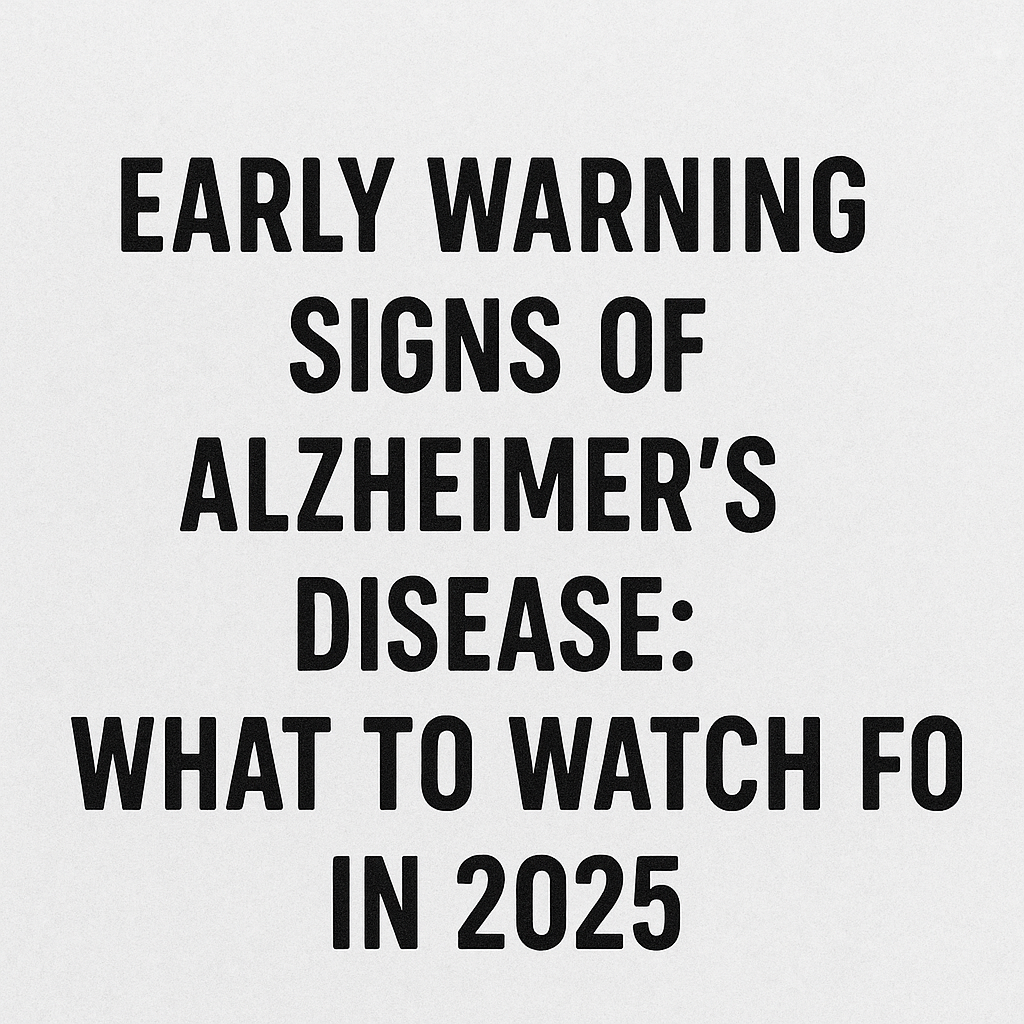Early Warning Signs of Alzheimer’s Disease: What to Watch for in 2025
Alzheimer’s disease affects millions of Americans, and recognizing its early warning signs can make a meaningful difference. While mild forgetfulness can be a normal part of aging, certain symptoms may indicate something more serious. Knowing what to look for—and when to seek help—can lead to earlier diagnosis, better care, and more treatment options.

Why Early Detection Matters
In 2025, early detection has become a cornerstone of Alzheimer’s management. New research shows that identifying symptoms during the mild cognitive impairment (MCI) stage can slow or even temporarily stabilize the disease’s progression. Advances in imaging, biomarkers, and digital memory tests now allow specialists to pinpoint neurological changes before significant damage occurs. Early detection not only helps patients access the newest medications and clinical trials but also gives families time to plan financial, legal, and long-term care decisions.
For caregivers, recognizing the first signs can also ease emotional strain by connecting loved ones with professional resources sooner. Many clinics now offer comprehensive memory assessments covered by Medicare or private insurance, making early testing more accessible than ever.
Common Early Symptoms to Watch For
The initial signs of Alzheimer’s can vary from person to person, but certain patterns are frequently seen. Memory lapses are the most recognizable symptom—forgetting appointments, repeating questions, or misplacing everyday items like keys or glasses. These lapses often involve short-term memory rather than long-term recollections.
Another sign is difficulty finding the right words or following a conversation. Someone might pause mid-sentence, lose their train of thought, or repeat the same phrases. Confusion about time or place also appears early; individuals may forget what day it is or feel lost in familiar settings.
Behavioral and emotional changes can emerge as well. Some people experience increased anxiety, irritability, or withdrawal from social activities. Tasks that once felt simple—like balancing a checkbook or cooking a familiar meal—may become overwhelming. These subtle changes, when persistent, warrant evaluation by a neurologist or memory care specialist.
Medical Tests and Diagnostic Advances in 2025
Diagnostic tools for Alzheimer’s have evolved dramatically. Physicians now use a combination of neurological exams, brain imaging (MRI and PET scans), and blood tests that detect abnormal protein levels associated with the disease. Biomarker testing for amyloid and tau proteins, once available only in research settings, is now approved for broader clinical use in the U.S.
In addition, digital cognitive tests can track changes in memory, reaction time, and reasoning ability using tablets or smartphones. These remote screening tools allow for continuous monitoring and can alert doctors to early declines. For many Americans, Medicare and private insurers now cover these assessments annually under preventive care benefits.
High-cost procedures like PET scans may still require copays, but early testing can significantly reduce overall care costs by identifying treatable conditions or allowing access to disease-modifying therapies sooner.
New Treatment Options: Hope on the Horizon
The treatment landscape for Alzheimer’s in 2025 is more promising than ever. Two drugs—Leqembi (lecanemab) and Donanemab—have gained FDA approval for slowing cognitive decline by targeting amyloid buildup in the brain. These medications are administered through regular infusions and are most effective when started early, emphasizing the value of early detection.
While these treatments don’t reverse Alzheimer’s, they represent a major step forward in managing symptoms and improving daily function. Ongoing clinical trials are exploring combination therapies that address both amyloid and tau proteins, potentially offering even greater protection.
Beyond medication, non-drug therapies such as cognitive stimulation, personalized exercise plans, and diet modifications (including the MIND and Mediterranean diets) are showing measurable benefits. Integrative programs now combine neurological treatment with lifestyle coaching to preserve mental sharpness and independence.
Financial and Care Planning Considerations
Alzheimer’s can create significant financial challenges, especially as symptoms progress. In response, more insurance providers—including Medicare Advantage plans—now cover memory care coordination, home health aides, and even respite services for caregivers. Some states offer grants or tax credits to families managing dementia care at home.
For those seeking long-term care coverage, early diagnosis is crucial. It enables individuals to qualify for benefits while they still meet eligibility criteria. Financial planners increasingly recommend setting up health savings accounts (HSAs) or long-term care insurance before symptoms advance.
Community-based resources, such as the Alzheimer’s Association Helpline and local memory care support groups, provide guidance on affordable care options and emotional support for caregivers navigating this complex journey.
Lifestyle Choices That Protect Brain Health
While there is no cure for Alzheimer’s, numerous studies link healthy lifestyle habits to lower risk. Regular aerobic exercise, a nutrient-rich diet, quality sleep, and consistent mental engagement can all support brain function. Researchers emphasize the importance of maintaining social connections and reducing stress, which both strengthen neural resilience.
Nutritional supplements, such as omega-3 fatty acids, vitamin D, and curcumin, have shown modest benefits in protecting brain cells, though they should always be used under medical supervision. Managing conditions like high blood pressure, diabetes, and cholesterol also plays a major role in preserving cognitive health.
Modern “brain health” clinics now offer personalized prevention programs, blending medical testing with wellness coaching to help adults monitor cognitive performance and delay decline.